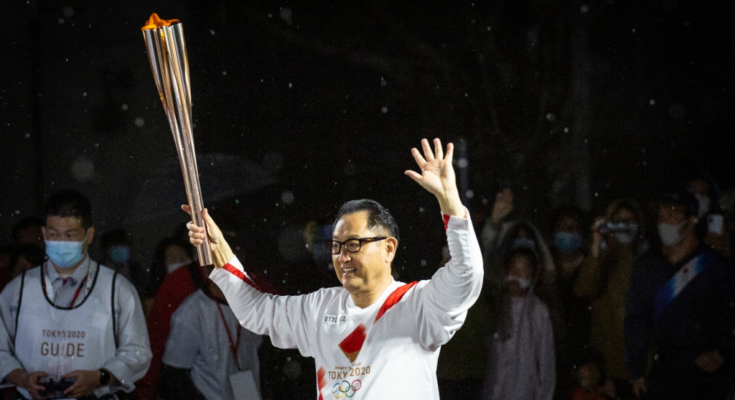Toyota Motor Corp., a top corporate sponsor for the 2020 Tokyo Olympics, has decided to pull all of its Olympics-related TV commercials in Japan.
Japanese media speculated Monday that the decision was made because the car manufacturer fears association with the troubled Summer Games, which are deeply unpopular in Japan, may tarnish its brand rather than burnish it.
“The Olympics is becoming an event that has not gained the public’s understanding,” a Toyota public relations executive surnamed Nagata told Japan’s daily Yomiuri newspaper Monday. The executive added that Toyota CEO Akio Toyoda and other senior executives would not be attending the Tokyo Summer Olympics opening ceremony on July 23.
Toyota was planning to run a series of TV ads in Japan featuring the Olympic athletes whom the company sponsors.
Now, media analysts will be watching to see if the decision from Toyota, a titan of the Japanese business world, results in other local sponsors and advertisers distancing themselves from the Games. Collectively, some five dozen Japanese companies spent more than $3 billion to sponsor the Tokyo Olympics, the largest contribution from an Olympic host nation’s businesses ever.
The possibility of Japanese brands bailing from the Games has been a topic of speculation for weeks thanks to the sour feelings many Japanese residents hold towards the event.
With Tokyo under its fourth state of emergency amid a rise in Delta variant COVID-19 cases, public concern remains high that hosting an event involving tens of thousands of athletes, officials and journalists entering the country from around the world will endanger the lives of local residents.
Olympic organizers reported more than 25 positive coronavirus tests over the weekend among people who had traveled to Japan for the Games — including two athletes and one organizer staying within the Olympic village, where thousands of participants will soon congregate. Meanwhile, an Ugandan weight lifter reportedly went missing from his hotel and was thought to be at large somewhere in Osaka Prefecture, despite organizers’ promises to keep athletes and guests within an Olympic “bubble” throughout the Games.
In a poll released Monday by the Asahi newspaper, 68 percent of respondents said they doubted the ability of Olympic organizers to control coronavirus infections, while 55 percent said they were opposed to the Games going ahead as planned.
With the Games set to begin in four days, just a little over 20 percent of the Japanese public is fully vaccinated against the novel coronavirus.
In addition to TV advertising, many of Japan’s major Olympic sponsors were planning to stage large-scale on-the-ground marketing activities to drum up enthusiasm for their brands amidst the event’s excitement. Those plans were laid to waste two weeks ago, though, when Olympic organizers announced that spectators would be banned from almost all Olympic venues.
Fifteen Japanese companies, including Asahi Breweries — the official beer of the Tokyo Olympics — paid about $135 million each to become Tokyo 2020 Gold Partners, the most expensive tier of sponsorship offered to local companies for a single Games.
Meanwhile, Japan and its taxpayers are estimated to have spent more than $26 billion on hosting the Games, including additional cost overruns because of the yearlong postponement.
When Tokyo was awarded the 2020 Summer Olympics in 2013, organizers forecast that spectators, mostly incoming foreign tourists, would spend about $2 billion on tickets, hotels, meals and merchandise; and that the word-of-mouth effect of the foreign influx and attention, what economists called “legacy effects,” would generate an additional $10 billion in inbound tourist spending over the coming decade. Under current restrictions, however, nearly all of that anticipated economic benefit for Japan is long gone.


